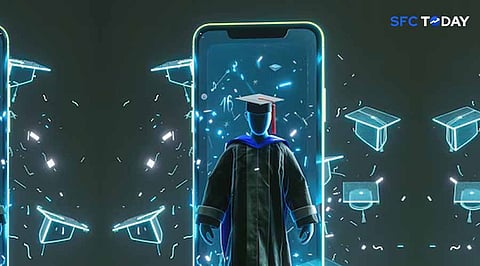

The new era of this fast world makes verification of academic credentials quite vital. Being vulnerable to fraudulence, blockchain is emerging as an innovation that has promised security, transparency, and efficiency in academia with traditional approaches that require lengthy and highly priced processes. Using the capabilities of blockchain will help educational institutes to store and share and verify all kinds of academic credentials. Fraud will then reduce and streamline the process.
The global economy is growing increasingly interdependent, which means that academic qualifications must be easily portable and verifiable. Verifying academic credentials such as degrees and certificates can be challenging for employers, universities, among other institutions. Today, they are available from diploma mills and counterfeit qualification providers and the whole process tends to be very time-consuming and vulnerable to human errors. This, in turn, has created an urgent need for a safe and reliable system for the efficient management of academic records. For this reason, blockchain is the best fit for the purpose.
Blockchain is a decentralized ledger system that records transactions across multiple computers. In academic credential verification, blockchain allows the secure recording and sharing of academic achievements. The record once issued, once added to the blockchain is an immutable, tamper-proof degree. The same therefore gives an opportunity to the institution issuing it to offer securely encrypted, tamper-proof, digital diplomas, thereby verifying in an instant without having any intermediary step from access through an employer or university.
For instance, a diploma of a student can be put in the blockchain and later when verification is required, say, by an employer, he will check directly in the blockchain record instead of going to the institution that issued it, making verification faster, more reliable and having fewer opportunities for fraud.
Blockchain technology brings several major advantages to academic institutions and the larger education sector:
Security and Anti-Fraud: Since the blockchain records cannot be forged or altered, only original records are generated; therefore, there is much lesser scope for fraud and forgery.
Efficiency: Blockchain forms a decentralized network; thus, third-party verification services are not necessarily required. Any institution or employer would be able to verify their credentials in real-time, thus saving on both time and money incurred as part of the conventional process.
Transparency and Trust: The blockchain is an open system, and all the transactions and records are verifiable, hence the integrity of data can be trusted by students, employers, and academic institutions.
Universality and Portability: The blockchain credentials will make the qualifications universal. Any student will carry the qualifications with them across the borders without a hassle or a process of re-verification.
Despite the challenges, blockchain in academic credential verification faces a lot of hurdles:
Technical: It involves substantial technical expertise and infrastructure for implementing a blockchain; many of the traditional systems would need to be transitioned to blockchain, which can be expensive and labor-intensive.
Regulatory: Data management by blockchain in education is usually subject to strict privacy regulations. The products need to be designed with compliance in mind, especially as far as global data protection regulations such as GDPR goes.
Institutional Resistance: Change is not easy in well-established institutions. Many universities and schools will resist the adoption of blockchain due to a lack of understanding or fear of disrupting the existing systems.
Interoperability: Institutions will use different blockchain protocols, which will raise compatibility issues. Developing a unified standard for blockchain usage in education is essential for integration.
The blockchain technology is going to transform academic credentialing in the very near future. Once the institutions fully understand that blockchain facilitates highly secure and efficient credentialing, more of them would be more accepting of it. Perhaps the government agencies and other institutions of higher learning will codify the rules to use it for their record of credential. The advances in smart contract functionality may be helpful in automating processes like course enrollment or granting degrees.
An emerging opportunity for a decentralized learning platform is the blockchain solution for education. It may be possible for students to achieve and verify various micro-credentials and certifications through one trusted blockchain in one location.
Blockchain technology soon will change everything in the education sector about how academic credentials verification will be implemented. Probably the greatest advantages brought by blockchain about the education sector are security, transparency, and efficiency. It certainly has its adoption and regulatory challenges, but that apart, the benefit blockchain brings to the education sector cannot be denied. As the world is getting digital, the role of blockchain in verifying academic credentials will surely go up, providing a safe and reliable system both to the institutions, the students, and the employers.